Horse deaths trial wraps up
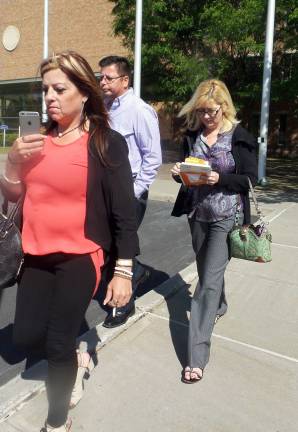

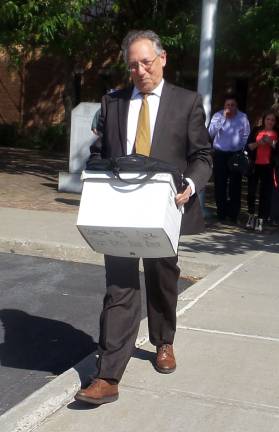

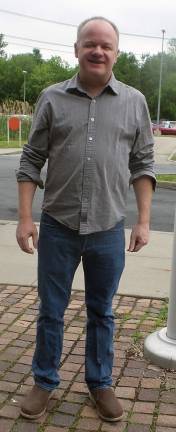
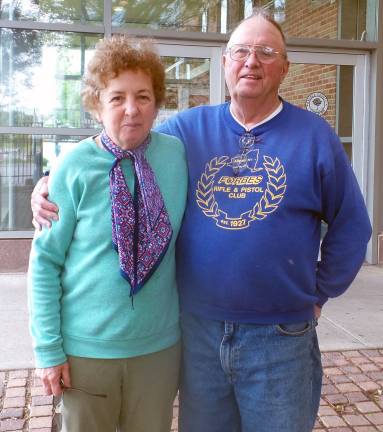
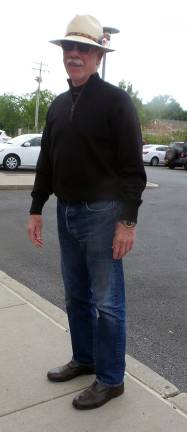
By Frances Ruth Harris
GOSHEN — Jeanne Ryan married her neighbor Stanley Dickel on May 23, right in the middle of her trial for animal cruelty.
The courtroom was stunned. There was a barely audible gasp.
The two might end up in prison at the same time. Dickel is currently awaiting sentencing for a probation violation for removing a tracking device.
Ryan of Argus Farm is charged with the deaths of 10 horses found last summer locked in a barn, dead from starvation.
Ryan's trial ended Tuesday, after nine days. Judge Robert Freehill gave her lawyer, Michael Sussman, and the prosecutor, Chief Assistant District Attorney Christopher Borek, until July 6 to file their post-trial memoranda. After that, they'll have a week to submit rebuttals. The judge said he would render a verdict on July 23.
During the trial, which began on May 7, Sussman has been pinning the blame on Ryan's son, Jimmy McSwigin. He grilled McSwigin and his then-girlfriend, Erika Pohja, about the dates and times they fed the horses. The two helped Ryan with chores but have said they stayed at Argus Farm only intermittently during that time.
On Monday, day eight of the trial, Sussman argued that McSwigin and Pohja were unable to recall even the correct years in their testimonies, and made a motion to have the charges against Ryan thrown out. Freehill denied the motion.
Dead, but not thinDickel said he buried a dead, but not thin, horse on Ryan's property. Borek asked Dickel if he changed his testimony was to help his wife, since his grand jury testimony says he'd dug a hole in 2015 to bury a horse but didn't see the horse.
Dickel said he didn't want anything to happen to Ryan.
He said he found drug paraphernalia when cleaning McSwigin's room after McSwigin left the farm.
Then, one day, he said, he happened to go into the barn and found the dead horses. He said Ryan was unable to talk about them.
McSwigin was supposed to be taking care of the horses but told Dickel he didn't like doing it, Dickel said.
Borek cross-examined Dickel about his numerous DWIs, violations of parole, and one burglary-larceny.
When Ryan herself testified, she said she'd retired from the New York City Police Department because of Lyme disease, depression, and PTSD.
Ryan said she told her son to feed the horses two flakes of hay, morning and night, along with grain and, for some of the horses, beet pulp. She said her son told her he put antifreeze in the beet pulp.
In March 2017, she said, she went to the barn to see the horses and found five of them dead. They were the horses that got the beet pulp, she said.
She said McSwigin attacked her, jumping on her back and trying to choke her, shortly after she discovered the dead horses. Ryan pressed charges against McSwigin, and he was arrested.
Horse owners and breeders attending the trial told The Chronicle some of their horses eat a whole bale of hay in one day, and that Ryan's horses were on a starvation diet.
Ryan said she had spells of vertigo along with fainting and balancing problems beginning in fall 2016. She said she fell down a flight of steps and after that and couldn't walk to the barn. She depended on McSwigin for help with the horses, she said.
Seamus' miseryOn Tuesday, the trial's final day, the misery of the surviving horse, Seamus, was portrayed in photographs that showed him emaciated and standing in a foot of manure among carcasses.
Ryan said she thought Seamus looked okay when shown a picture of him just after he was rescued.
She said did not see a problem with keeping Seamus in the barn with the carcasses and manure. She said she didn't notice any insects or maggots.
"Bugs were not crawling on Seamus," she said.
Did she know Seamus was eating his own feces? Borek asked. She shrugged and said no.
When shown one of Seamus' overgrown and infected hooves, Ryan seemed unmoved and said every horse has different requirements of care.
Borek questioned her about her medical records, suggesting she retired to avoid an internal investigation by the New York City Police Department. He also said the hospital reported Ryan could walk with a "steady" gait when discharged.
Ryan said she could walk only on even ground, and that the route to the barn from her house was uneven. She said she cared for the horses after her son left.
Borek showed pictures of Ryan in Goshen during a period when Ryan said she couldn't walk. They showed her protesting in front of Legoland's office, trying on clothing in a store, and posing for pictures.
Ryan said she did not harm her horses in any way. She fed them sufficient food and cared for them, she said.
Freehill admonished the courtroom midway through the day, telling spectators they had to be quiet and respectful or be removed.
This "isn't a Saturday afternoon at the movies," he said.